A Zionist State in 1939CIE+
“A Zionist State in 1939,” Dr. Kenneth W. Stein, CHAI (Atlanta), Winter 2002 “Had not the Nazi crimes been committed against Jews during World War II, the Jewish State would have never come true.” So…
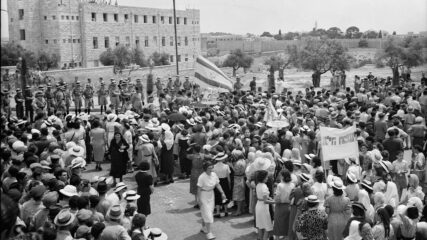
“A Zionist State in 1939,” Dr. Kenneth W. Stein, CHAI (Atlanta), Winter 2002 “Had not the Nazi crimes been committed against Jews during World War II, the Jewish State would have never come true.” So…
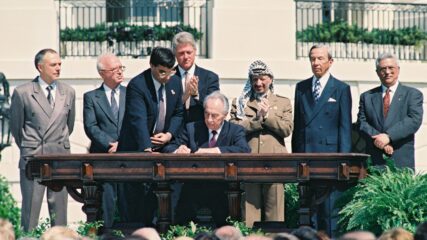
In September 2023, thirty years after the historic signing of the Oslo Accords, there is occasion to review Prime Minister Rabin’s understanding of them. I assembled this collection years ago from Daily Reports- Near East and South Asia, 1993-1995. Two short items about Rabin’s views are also found or linked here. Rabin provided a summary of his views of the Accords in a Knesset speech in October 5, 1995. Some of Rabin’s reasons for signing the Accords are also provided in Yehuda Avner’s The Prime Ministers.

Kenneth W. Stein, “One Hundred Years of Social Change: The Creation of the Palestinian Refugee Problem,” in Laurence Silberstein (ed.), New Perspectives on Israeli History: The Early Years of the State, New York University Press,…

Comparing the 1936-39 Arab uprising in various parts of western Palestine and the intifada that began in 1987 in the West Bank, the Gaza Strip and East Jerusalem, the most striking conclusion is the large number of general similarities between these manifestations of Palestinian national consciousness. The two most significant differences, however, are that the 1987 intifada generated a deeper and more prolonged Palestinian national coherence across all classes than did its predecessor and clarified and crystallized Palestinian opinion, which helped create a historic compromise in Palestinian public policy.

Kenneth Stein, “Rural Change and Peasant Destitution: Contributing Causes to the Arab Revolt in Palestine, 1936-1939,” John Waterbury and Farhad Kazemi (eds.), Peasants and Politics in the Modern Middle East, Florida International University Press (1989), pp. 143-170….
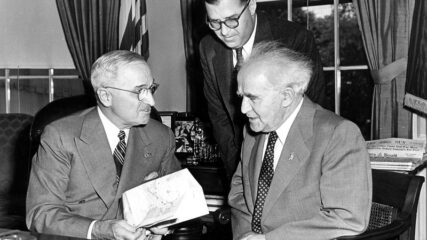
Otherwise known as Israel’s War of Independence, or, “the nakbah” or disaster to the Arab world because a Jewish state was established, the war was fought between the newly established Jewish state of Israel opposed by Palestinian irregulars, and armies from five Arab states. Official beginning of the war is usually given as May 14, 1948, the date Israel declared itself an independent Jewish state, but the war’s first of four phases began in November 1947. Lasting for two years, the war ended with armistice agreements signed in 1949 between Israel and four Arab states.

The Palestinian Arab elite chose to boycott in virtually all British and U.N. overtures to them from 1920 to 1948, with egregious consequences. The Palestinian Arab elite shunned British officials who were staunch supporters of…
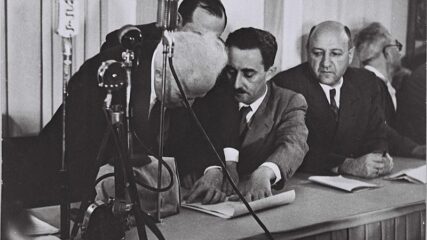
In the months before the UN vote to partition Palestine into Arab and Jewish states in November 1947, the Jewish Agency leadership there had to overcome a series of foreign policy obstacles working against the Jewish state’s establishment.

The 1937 plan to partition Palestine was never implemented. It did, however, remain a workable political option for resolving the conflict between Arabs and Zionists. Britain needed to placate Arab state opposition to Zionism, so it refrained from actively revisiting the partition plan.
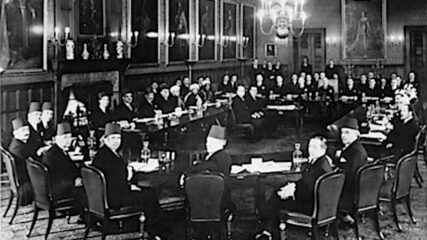
Steady disintegration of Palestinian Arab society from 1945-1949 is detailed by five Arab and non-Arab historians citing local social cleavages, economic impoverishment, fear, indebtedness, and political dysfunction.

Using published archives, press conferences, speeches and numerous interviews, this compilation of quotations traces how official American views on Zionism and Israel have evolved over a century.
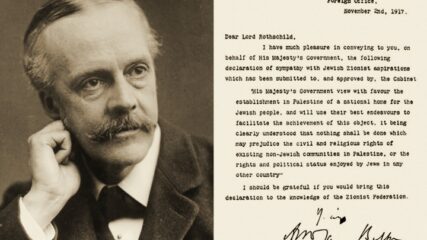
November 2, 1917 The Balfour Declaration was the Jewish charter that Herzl failed to obtain from the Ottoman sultan 20 years earlier. The terms were included in the preamble of the Palestine Mandate’s Articles in…